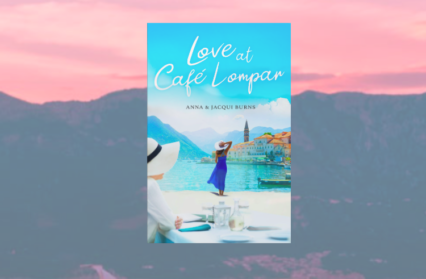Zoe Kramer reviews Love at Café Lompar, a novel by mother-daughter duo Anna and Jacqui Burns which follows an unconventional holiday to Montenegro taken after a disturbing family secret is brought to light.
Love at Café Lompar is escapism in its purest form, and the main appeal of the book is that it doesn’t shy away from this. It is unapologetic in its embrace of everything feminine, sentimental, and beautiful. Written from a unique perspective of a mother and daughter narrating alternating chapters, Anna and Jacqui Burns’ debut novel explores the intricacies of a family that is anything but conventional.
Grace’s life is upended when she discovers that her recently deceased husband, Dan, had another family and another life in Montenegro. Kat struggles to come to terms with her father’s betrayal. Lost and confused, the duo travel to Montenegro to try to find answers. Kat connects with her half-brother and what was supposed to be a short trip turns into a new life.
The setting is perhaps the most crucial aspect of the story. While Grace and Kat’s perspective on Montenegro is decidedly British, this outsiders’ perspective slowly shifts over the course of the novel as Montenegro becomes a home for them in different ways. There is an eagerness and an infectious curiosity from this tourist perspective, and an earnestness in its pursuit of fantasy over reality. The book doesn’t just visit but rather basks in the Montenegrin sun.
The spotlight on cuisine in the book is refreshing, and brings in one of the sensory experiences that many authors overlook — taste. The details of recipes Kat invents and plays with are highly immersive and bring the reader into the atmosphere of the cafe. Even in the clashing of cultures, food is a universal language, and is one of the primary ways that Kat finds her home. The addition of a recipe the reader can use at the end of the book is a delightful addition.
The plot, however, leaves something to be desired. Of its principal antagonists, Dan is already dead in the beginning of the story, and Ivan is two-dimensional, with his main motivator being a backstory mentioned only in passing by a different character. Adam doesn’t even have as much as Ivan to redeem him — making him enjoyable to hate, but rendering his and Kat’s breakup a foregone conclusion from the beginning. Because the antagonists lack depth, the main dramatic throughline of the book is left stilted, with low stakes even in the highest moments of tension.
Indeed, while on the surface level the book contains a significant amount of drama, there is an element of investment missing. The book often takes an almost gossipy tone — the reader is given all the details of the scenario, but is not close enough to the characters for it to bear much weight. For example, one side plot revolves around Grace’s friend Claire’s rebellious daughter and her ne’er do well artist boyfriend. However, both characters are given insufficient personality beyond the brashness of their youth, so that when they finally break up it is of little consequence and one wonders why the subplot was introduced at all.
That being said, I would be remiss not to acknowledge the heart-warming moments of the book. Instead of resenting Rosa, the other woman, Grace slowly begins to form a bond with her. Kat finds comfort in her newfound bond with her brother Luka. The mother and daughter reclaim the pain of Dan’s betrayal and turn it into love for a newfound family. This depth and empowerment certainly goes beyond your average holiday read.
Love at Café Lompar is available via Honno Press.











